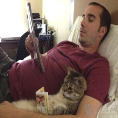题目内容
This year has been a busy year of travelling for me, and the end of the year is no exception. I booked an early morning flight so I had to get up at 4:30 am to get to the airport. The thought of such an early flight made me not very happy, but then I started to think about the people who would make that early journey possible for me: my taxi driver, check-in agent, security staff, gate agents, flight crew, etc. They all do their jobs at an early hour so I can get to my destination safely, often for very little money.
When that trip came, I realized I had a choice: I could be angry about having to take an early flight, finally showing my anger to everyone I see. Or I could choose to be grateful to this modern machine of safe air travel and the people who made it possible. Just thinking about the latter choice got my mind working about how I could show my thanks, and I decided to do a little “experiment”: what if I got a little gift for every worker I met my journey? How many gifts would I end up giving out?
Then I started to think about what kind of gift would be good for such an experiment.
The payback from this experiment started immediately. For the first time in years I actually looked forward to getting up at 4:30 am! I ended up giving a gift cards to my taxi driver, airport security agent, two gate agents, and four fight attendants, and all of them said thank you and smiled sweetly. And, instead of arriving tired and sad after four hours of sleep and a long flight, I was excited and happy to share my story.
Change your attitudes( 态度)and choose to do something good for others can help yourself feel good, too.
1.At first, the writer felt when she thought of getting up so early.
A.worried B.unhappy C.excited D.nervous
2.What is "payback" of the writer's experiment?
A.She spent some money on some postcards.
B.She showed thanks to the people around.
C.She felt great towards the coming travelling.
D.She got lots of presents from the other people.
3.What's the passage mainly about?
A.The reasons why the writer don't like travelling early in the morning.
B.How the writer's attitudes towards her travelling changed.
C.Why we should be thankful for others help.
D.The writer's most wonderful travelling experience.
Some animals are so tiny that you cannot see them clearly. Others are huge. All of them are interesting. Let s have a look at some of them. | |
| The hippo(河马 )is the third biggest land animal. It is a little smaller but heavier than the white rhino(犀牛). The elephant is the biggest animal on the land. |
| The adult frog is a carnivore and will eat any other animal smaller than itself,including insects(昆虫)and even other Frogs.But it doesn't like eating grass and leaves Many frogs are small, but the largest frogs are the Goliath frogs. They have the same size as baby sheep. |
| Parrots(鹦鹉) are beautiful and clever. they have the feather with beautiful colors .They can live 40 years and even to 100 years. They like talking very much. |
| Although a cow has no upper front teeth, it eats grass up to 8 hours a day, eating about 45kg of grass and drinking the same amount of water. |
| Bees live and work in large groups They do not have ears, but they have a good sense(感觉)of smell. I think they are the most hard-working animals. |
注释: carnivore n.食肉动物
1.Which animal is the second biggest on the land?
A.The elephant. B.The hippo C.The white rhino.
2.According to the passage, which animal eats frogs?
A.The frog B.The cow C.The parrot
3.How much grass does a cow eat for a day?
A.45 kg. B.315kg. C.515kg.
4.Which animals work hardest according to the passage?
A.Parrots B.Cows C.Bees.







